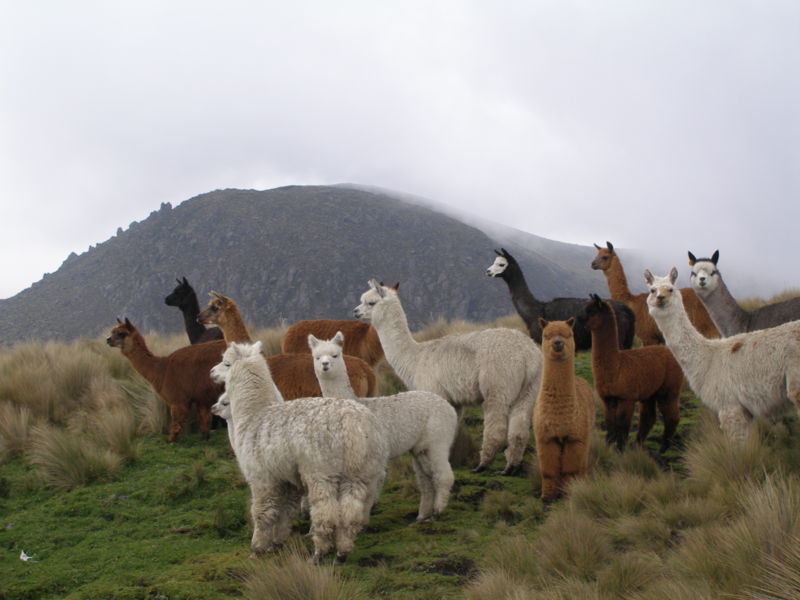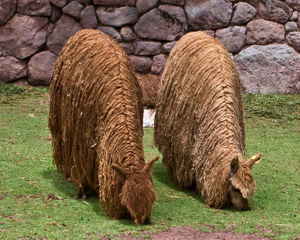Alpaca is a domestic variety of the camelid family. It was domesticated 7000 years ago by Andean shepherds. The ancestors of the alpaca are the vicuña and the guanaco.

The alpaca weighs between 55 and 50 kilo-grams and its height is about 0.95 meters, a little bit bigger than vicuñas.
It's a typical animal of the altiplano which is really appreciated for his fiber.
The diameter of the fiber is between 12 and 32 microns and the most appreciated fibers come from the first cut of the alpaca, called “baby alpaca”.
The great value of its fiber began to be appreciated in the Andean textiles, around 1200 A.C. In the Andean economy the alpaca was the treasure of the ancient Inca civilization, located in the mountains and Andean Plateaus. This type of fiber was reserved for the Inca kings and the religious ceremonies (“the fiber of the Gods”).
During 3000 years, the Andean zone of Bolivia and Peru was one of the world zones where the best textiles were fabricated. This tradition of textiles was based in one thing; the availability of deluxe natural fibers, such as vicuña and alpaca. Even today the marvelous samples of textile art are produced by pre-columbian Andean weavers.
In the XVII century the Spaniard conquerors killed the majority of the Inca population, and also a great number of alpacas. The survivors were forced to look for shelter in the plains of the high mountains of the Plateau. The altitude and the rough nature guaranteed the survival of the most resistant alpacas; this gave its descendants a great race and strong genes, the result was a fast animal, resistant and with a dense and high quality fiber.
Today the alpacas graze in numerous herds in the heights plains of the Andes of Peru, of northern Bolivia and north Chile in an altitude of 3.500 to 5.000 meters above sea level, all year long.
The alpacas have a soft character, easy to handle. They do not bite, or hit with the head (contrary to what Captain Haddock might think). They do not have incisors, horns or claws.
As opposed to the llamas, they are not used as carrying animals. Its wool is appreciated to make blankets, traditional indigenous ponchos and other multiple clothes for local consumption and export.
 There are two varieties of alpaca: Huacayo and Suri. The Suri alpaca has silky, long and shiny fiber. The Huacayo alpaca has short, curled, dense and spongy fiber that covers almost all its body leaving the face uncovered with short hair.
There are two varieties of alpaca: Huacayo and Suri. The Suri alpaca has silky, long and shiny fiber. The Huacayo alpaca has short, curled, dense and spongy fiber that covers almost all its body leaving the face uncovered with short hair.
The alpaca in its two types, Suri o Huacayo, is the source of a beautiful fiber, of exceptional shine and extraordinary texture, its refinement is between 19 microns (Royal Alpaca), 22 microns (Baby Alpaca), 25,5 microns (Super Fine Alpaca) and the 32 microns (thick fiber).
Each quality is used to create different products such as cloths, scarfs, sweaters, blankets, carpets, etc., mixing also with other natural fibers.
 Alpaca fiber constitutes the only fiber in the world that presents an extensive range of natural colors, which range from white to black, crossing through a rich scale of maroon and gray tones.
Alpaca fiber constitutes the only fiber in the world that presents an extensive range of natural colors, which range from white to black, crossing through a rich scale of maroon and gray tones.
The alpaca is sheared once a year, each alpaca gives 5 to 10 pounds, that means 2,2 to 4,5 kilos of soft fiber that become luxury garments for the whole world.


